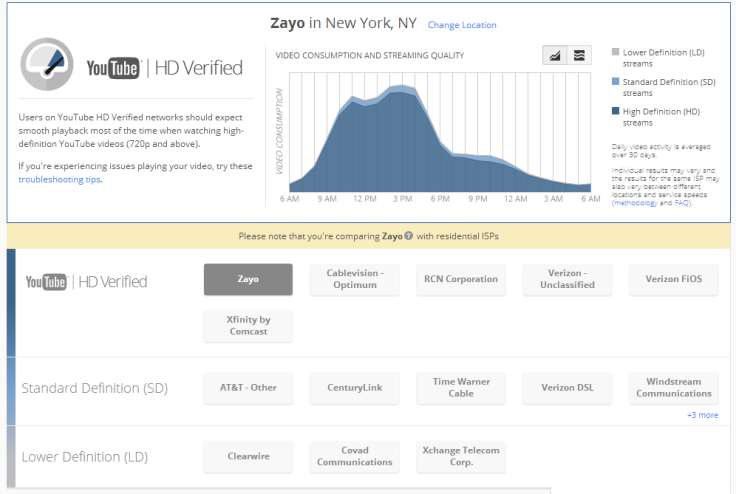YouTube Buffering Slow? Bad Streaming Speed Is Your ISP's Fault, Google Says

Google (NASDAQ: GOOG) has unveiled a new website that promises to help frustrated YouTube users reduce their buffer time by ranking Internet Service Providers by how much time it takes customers to load a video across a number of streaming platforms.
Whenever a YouTube user is watching a 20-minute compilation of funny cats or improving their photography skills and the video suddenly cuts out, the site will show a link that redirects users to a Google Video Quality page explaining how streaming speed is impacted by a variety of factors, including a person’s ISP. It might recommend that a YouTube viewer stick with standard definition streaming instead of opting for high quality, for example, and compare that individual’s streaming speed with the speed made possible by other ISPs in the area.
“There are many factors that influence your streaming quality, including your choice of Internet Service Provider,” the site reads. “Learn how your ISP performs and understand your options.”
Google gauges ISPs based on how quickly billions of YouTube buffer over a 30-day span then divides that result by an individual’s ISP and location, YouTube spokesman Mat McLernon told Reuters. That process helps the company assess performance instances accurately 90% of the time.
“We are just basically providing information, not trying to tell people to change their behavior or do anything different,” he said.
Not that this is all about generosity. While YouTube is certainly trying to helping people improve their video streaming quality, it also helps them and other Internet content creators in their long-running feud with ISPs over who is to blame for network connection issues.
Netflix (NASDAQ: NFLX) recently broadcast the message “The Verizon network is crowded right now. Adjusting video for smoother playback” when customers suffered streaming interruptions. Verizon (NASDAQ: VZ) was infuriated by the message, calling it “deliberately misleading” and threatening legal action if Netflix didn’t remove the note, which Netflix did last month.
The passive-aggressive tactics are part of a much larger issue known as net neutrality. A federal court recent paved the way for ISPs like Verizon and Comcast (NASDAQ: CMCSA) to begin charging content providers (like Google and Netflix) more to broadcast their signal clearly.
© Copyright IBTimes 2024. All rights reserved.











